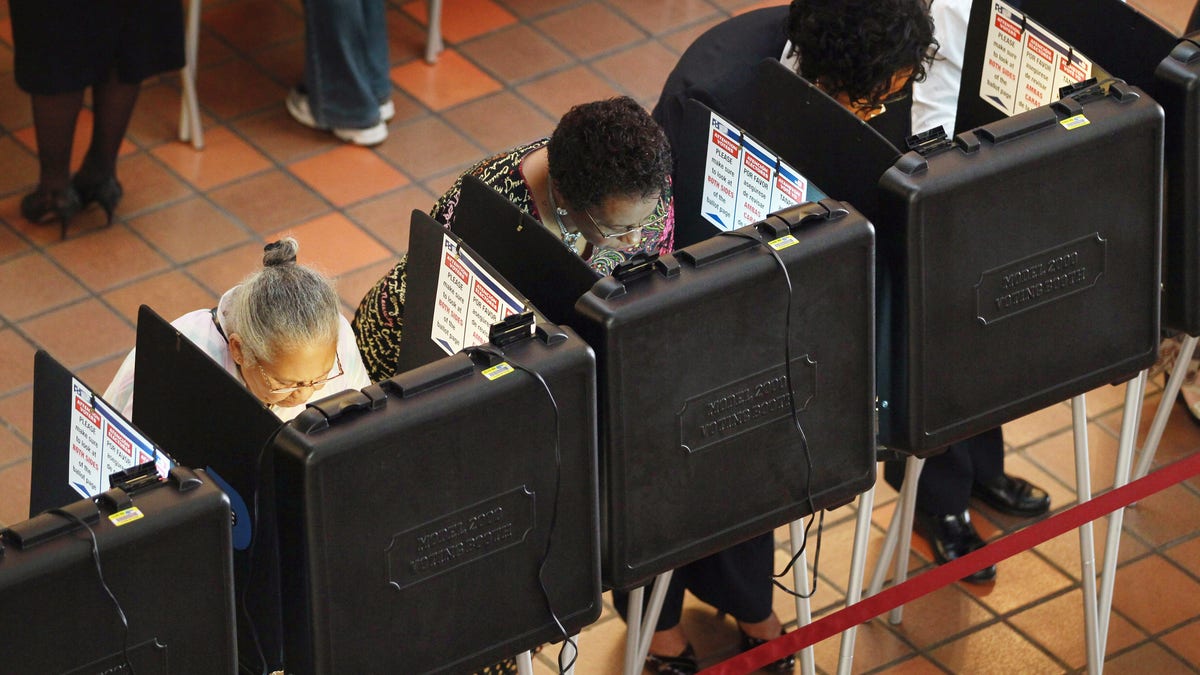
MIAMI - OCTOBER 18: People cast their votes at a polling station set up at the Miami-Dade Government Center on October 18, 2010 in Miami, Florida. Florida residents headed to the polls to cast votes on the first day of early voting in teh midterm elections. (Photo by Joe Raedle/Getty Images) (2010 Getty Images)
Just in time for the 50th anniversary of the 1965 Voting Rights Act, a panel of federal appeals court judges in Texas last week ruled against the state’s Voter ID law. They agreed that the law violated the provisions of the Voting Rights Act, because it disproportionately impacted Latino and African-American voters. In response, Texas Governor Greg Abbott said in a statement, “Texas will continue to fight for its voter ID requirement to ensure the integrity of elections in the Lone Star State.”
True, these days a valid ID is necessary to board a plane or to buy alcohol. But travelling or buying beer is not a constitutional right; voting is.
Texas’ Voter ID law is a solution in search of a problem. While in theory it fights voter fraud, in reality it has disenfranchised thousands of minority voters. Texas’ Voter ID law deserves to be amended or dismantled so that all eligible voters have equal access to the ballot box.
Texas has the strictest voter ID law in the country. People can vote only if they show a driver’s license, passport, concealed handgun license, or an election identification certificate from the Department of Public Safety. But not everyone has these documents. The law creates problems for people who may not have been born in state, for those who don’t drive or whose license has expired, and for those without the resources to visit one of the state’s Department of Public Safety offices.
Other forms of government-issued photo I.D. are not acceptable as proof of identity to vote in Texas, including government employee I.D. cards or student I.D. cards from the state’s public colleges. Voter registration cards are not accepted either.
The Republican lawmakers who passed this law say that it was necessary to stop voter fraud. However, the crime of voter fraud is extremely rare. Justice Ruth Bader Ginsburg, writing the dissent for a Supreme Court decision that allowed this law to stay in place, noted that there were only two in-person fraud cases prosecuted to conviction in Texas between 2002 and 2011. Nor is there significant evidence of voter fraud at the national level. A comprehensive analysis of voter fraud cases by the Washington Post found 31 credible incidents out of one billion ballots cast.
- Opinion: In Texas lawsuit, a 3/5ths person is now zero
- Rick Sanchez: In Texas attack, a hero emerges amid controversy and terror
- Rick Sanchez: Jeb goes off script on immigration, delivers unintended ‘read my lips’ moment
- Facing Deportation, Mexican Woman Offered Sanctuary At Arizona Church
- Scenes from busiest U.S-Mexico border crossing: San Diego
- Mariah Carey receives star on Hollywood Walk of Fame
- Day Laborers building chair for Pope Francis
Meanwhile, the effect of Texas’ Voter ID law has been very real. A study by the University of Houston showed that the law discouraged election turnout in November 2014, even among those with the proper documents. Texas’ Voter ID law is especially hard on the elderly. Last year, a 93-year-old veteran was turned away from voting by a judge because he lacked the proper identification; in 2013, former Speaker of the House Jim Wright, 90, was rejected from getting a Voter ID card because he didn’t have the required papers.
This Texas law has had a convoluted journey through the courts. A lower court judge once struck it down, finding that more than 600,000 Texans – disproportionately Latino, African-American, and poor – lacked the required documents and could be barred from voting. Likewise, the appeals court found that Hispanics were 195 percent and African-Americans were 305 percent more likely than whites to be without the required documentation to vote. Yet the law stands because Texas keeps appealing the court rulings.
True, these days a valid ID is necessary to board a plane or to buy alcohol. But travelling or buying beer is not a constitutional right; voting is. Texas should be making it as easy as possible to vote, since the state suffers from chronically low voter turnout. And consider that the latest ruling against the Voter ID law came from one of the most conservative courts in the country, and that the legal opinion was written by a George W. Bush appointee.
Now the Voter ID law will go back to a lower court for further review. The state can either appeal to the full Court of Appeals or take this case to the Supreme Court. Governor Abbott should do the right thing and allow the lower court to figure out an appropriate remedy to the law’s onerous provisions. One easy solution would be to allow voter registration cards as identification at the polls.
Governor Abbott ought to give up the fight for a measure that is a disgrace to democracy. The Texas Voter ID law is racially discriminatory and un-American.
